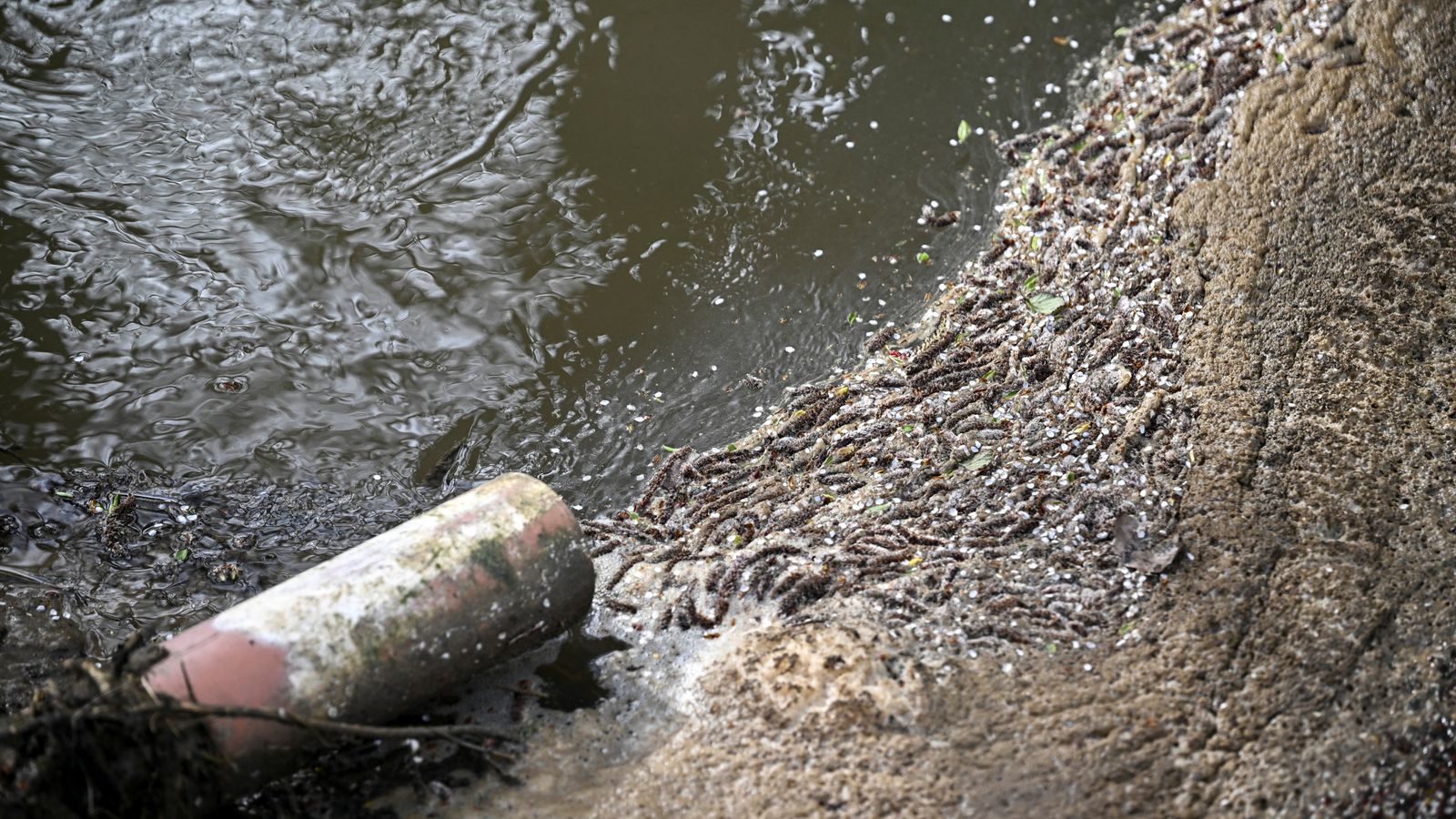Water firms have been accused of an “environmental cover up” as fresh figures revealed one in seven sewage monitors – meant to record spills – were faulty.
This rose to a third of devices for embattled Thames Water, which is facing the risk of emergency nationalisation as it wrestles with a deepening funding crisis.
The number of monitors not working properly has fuelled concerns the scale of the sewage scandal is far bigger than previously thought, further ramping up pressure on the utility firms and government.
Please use Chrome browser for a more accessible video player
It comes after separate figures showed dumping of raw sewage into England’s rivers and seas was the worst on record last year.
Discharges of untreated effluent by water companies doubled from 1.8 million hours in 2022 to 3.6 million in 2023, according to Environment Agency data.
The number of individual spills also soared by 54% – from 301,000 incidents in 2022 to 464,000 in 2023, which was blamed in part on the wet weather.
Campaigners argue the pumping of sewage into waterways is the symptom of chronic underinvestment by water companies.
In the face of public anger at widespread pollution, firms recently fast-tracked £180m of investment.
They also plan to invest £10bn by the end of this decade, which they say would lead to 150,000 fewer spills a year.
Please use Chrome browser for a more accessible video player
But analysis by the Liberal Democrats found that 15% of all sewage monitors were faulty, prompting the party to demand a national environmental emergency to be declared.
The number and length of sewage dumps from storm overflows, which act as safety valves during heavy rain to stop sewage from backing up into people’s homes, is measured by event duration monitors (EDMs).
However, Lib Dem research has revealed water companies have installed monitors which do not work at least 90% of the time, or have not even installed devices at all.
Across England, there are 2,221 monitors not operating properly.
Keep up with all the latest news from the UK and around the world by following Sky News
The water company with the worst record on faulty sewage monitors was Thames Water, with 33% of its equipment not functioning as it should, according to the Lib Dem research.
The next highest were Southern Water and Yorkshire Water, which both recorded 18.5% of their monitors as faulty.
Some devices have been broken for two years.
Read more:
‘It stinks’: Sewage seeps into people’s gardens
Analysis: Why nationalising Thames Water won’t work
Be the first to get Breaking News
Install the Sky News app for free
Liberal Democrat environment spokesperson Tim Farron said: “Water companies could be complicit in an environmental cover up. Why on earth would a firm install these monitors if they don’t even work?
“The scale of the sewage scandal could be even larger than originally feared and Conservative ministers are not interested in understanding the true extent of the damage our rivers and beaches are being put through.
“They have let water companies off the hook at every turn and are now letting them get away with not even monitoring the amount of filthy sewage that is being dumped.”
He added: “This scandal requires a national environmental emergency to be declared and for this Conservative government to start treating this issue with the focus that it needs.
“Their inaction has failed our environment and failed communities across the country.”
Click to subscribe to the Sky News Daily wherever you get your podcasts
A spokesperson for industry body Water UK said: “Water companies are committed to robust monitoring of storm overflows across England with all now monitored – the most comprehensive and extensive monitoring system in the world.
“Due in part to their operating outdoors and in all weather conditions, some monitors will occasionally be temporarily out of action while maintenance is under way.
“This has improved, and the regulator has taken tough new powers to ensure the highest standards.
“We are seeking regulatory approval to invest over £10bn over the next five years – three times the current rate – to increase the capacity of our sewers and remove more than 150,000 annual sewage spills by the end of the decade.”
The issue has become a political battleground, with Labour pledging to ban bonuses for water company bosses and the Greens wanting to renationalise the firms.
While Michael Gove, the former environment secretary-turned-housing secretary, said the leadership of Thames Water was a “disgrace” this week and insisted those responsible for failings must “carry the can”.









